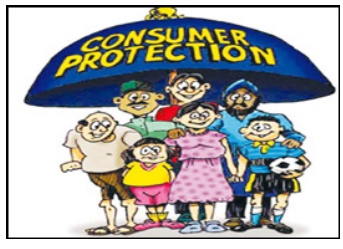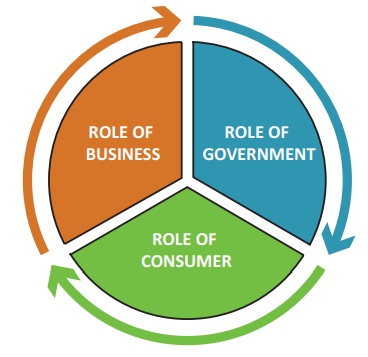Consumerism - Need for Consumer Protection | 12th Commerce : Chapter 16 : Consumer Protection : Consumerism
Chapter: 12th Commerce : Chapter 16 : Consumer Protection : Consumerism
Need for Consumer Protection
Need for Consumer Protection

Though consumer is said to be the king of entire
business sphere, his interests are virtually neglected. Shortage of goods makes
the consumers to be content with whatever is offered for sale. Quality is
sacrificed: warranty of performance has no meaning; health hazard is never
considered; profit maximisation turns out to be sole consideration of business
enterprises. In such a context, consumer protection remains a vital importance.
There are three parties involved in the sphere of business transactions viz.
the Government, business and the consumers. Let us discuss what each party has
to do in this regard

Role of Business
Business enterprises should do the following
towards protecting consumers.
1. Avoidance of Price Hike
Business enterprises should desist from hiking the
price in the context of acute shortage of goods /articles.
2. Avoidance of Hoarding
Business enterprises should allow the business to
flow normally. It should not indulge in hoarding and black marketing to earn
maximum possible profit in the short term at the cost of consumers.
3. Guarantees for Good Quality
Business enterprises should not give false warranty
for the products. It should ensure supply of good quality.
4. Product Information
Business enterprises should disclose correct,
complete and accurate information about the product viz. size, quality,
quantity, substances, use, side effects, precautions, weight, exchange, mode of
application etc.
5. Truth in advertising
Business enterprises should not convey false,
untrue, bogus information relating to the product through the advertisements in
media and thus mislead the consumers.
6. Protection from the Hazard
Business enterprises should not market the product
which is potentially hazardous and harmful. It should test the safety of the
product before they are marketed. As regards food items, business enterprises
should withdraw spoiled and contaminated food items.
7. Money Refund Guarantee
Where the product becomes defective, business
enterprises should replace it with new one or refund the purchase price. If the
product causes injury or harm to consumers, it should reimburse the
expenditures done by the consumers concerned.
8. Consumer Grievances
Where the business enterprises have customer care
department, it should handle the grievances’ of consumer immediately or within
a definite time frame.
Role of Government
Since most of consumers including academically educated
are illiterate about their rights and hence passive. Government should assure
an active role in safeguarding the consumers. Government both the central and
the state have brought out a number of legislations to protect the interest of
consumers across the country. Other statues have been listed out in the ‘Do you
know’ segment of this lesson. Despite the existence of legal system to protect
the consumers, consumers in India are still illiterate and passive. Mere statue
book will not address the problem. Law enforcement authorities should see that
penal clause is not mere paper jaws-they should sting the offenders
mercilessly.
Role of Consumers
Ultimately it is the consumer who alone can put an
end to all their unethical trade practices. Business enterprises may break the
codes and Government may rest content with mere enaction of laws and do little
to protect consumers. In this context consumers have to be vigilant and
organise themselves into a movement for concerted action.
Activation of Consumer Action Councils
1. Consumer action councils established at village
levels should educate consumers of the right.
2. Consumer protection agencies should take
necessary steps to investigate consumer complaints and grievances and arrange
to forward them to correct forum.
3. It should regulate business enterprises
according to the rules of the industry.
4. Voluntary consumer groups should provide
information so as to educate consumers on matters affecting them through media.
5. It should organise movement against the
malpractice of manufacturers and traders.
6. Consumer cooperatives need to be strengthened.
7. Consumer groups should contact the legislators
to raise the consumer issues in Assembly and Parliament.
8. There should be testing laboratories at each district
to test the purity of goods.
9. Voluntary consumer organisations should
publicise the malpractices of manufacturers and traders by media.
10. It should take initiation to report such
officials and authorities who let the offender to go scot free to follow
enforcement agencies.
United Nations Guidelines for Consumer Protection
The General Assembly of the United Nations passed a
Resolution on April 9, 1985
adopting a set of guidelines for consumer
protection to persuade the member countries to adopt policies and laws for
better protection of the interests of the consumers. The guidelines provided
that the governments should develop or maintain a strong consumer protection
policy, taking into account the guidelines.
Objectives of United Nations Guidelines for Consumer Protection
1. To assist countries in achieving or maintaining
adequate protection for their population as consumers
2. To facilitate production and distribution
patterns responsive to the needs and desires of consumers
3. To encourage high levels of ethical conduct for
those engaged in the production and distribution of goods and services to
consumers
4. To assist countries in curbing abusive business
practices by all enterprises at the national and international levels which
adversely affect consumers
5. To facilitate the developing of independent
consumer groups
6. To further international co-operation in the
field of consumer protection
7. To encourage the development of market
conditions which provide consumers with greater choice at lower prices.
Related Topics